The University of Chicago Press Chicago 60637
Routledge, London
1997 by The Estate of F. A. Hayek
All rights reserved. Published 1997
Printed in the United States of America
06 05 04 03 02 01 00 99 98 97 97 1 2 3 4 5
ISBN: 0-226-32058-8 (cloth)
ISBN: 978-0-226-32134-9 (e-book)
Library of Congress Cataloging-in-Publication Data
(Revised for vol. 9)
Hayek, Friedrich A. von (Friedrich August), 18991992
The collected works of F.A. Hayek.
Includes bibliographical references and indexes.
Contents: v. 1. The Fatal conceit v. 4. The fortunes of liberalism / edited by Peter G. Klein v. 9. Contra Keynes and Cambridge / edited by Bruce J. Caldwell.
1. Economics. 2. Free Enterprise. 3. Liberalism. 4. Social sciences. 5. EconomistsGreat BritainCorrespondence. 5. Keynes, John Maynard, 18831946. 6. Hayek, Friedrich A. von (Friedrich August), 1899Correspondence. I. Bartley, William Warren, 1934
II. Title.
HB171.H426 1989 330.1 8826763
ISBN 0226320685 (v. 1: alk. paper)
ISBN 0226320677 (v. 3)
ISBN 0226320642 (v. 4)
ISBN 0226320650 (v. 9)
ISBN 0226320588 (v. 10)

The paper used in this publication meets the minimum requirements of the American National Standard for Information SciencesPermanence of Paper for Printed Library Materials, ANSI Z39.48-1984.
THE COLLECTED WORKS OF
F. A. Hayek
VOLUME X
SOCIALISM AND WAR
Essays, Documents, Reviews
EDITED BY
BRUCE CALDWELL

The University of Chicago Press
PLAN OF THE COLLECTED WORKS
Edited by Stephen Kresge
| Volume I | The Fatal Conceit: The Errors of Socialism (1988) |
| Volume II | The Demands of Science: On the Uses and Abuses of Reason |
| Volume III | The Trend of Economic Thinking: Essays on Political Economists and Economic History (1991) |
| Volume IV | The Fortunes of Liberalism and the Austrian School: Essays on Austrian Economics and the Ideal of Freedom (1992) |
| Volume V | Good Money, Part 1: The New World |
| Volume VI | Good Money, Part 2: The Standard |
| Volume VII | Investigations in Economics |
| Volume VIII | Economics and Knowledge |
| Volume IX | Contra Keynes and Cambridge: Essays, Correspondence (1995) |
| Volume X | Socialism and War: Essays, Documents, Reviews |
| Volume XI | Essays on Liberty |
| Volume XII | Essays, Debates, and Reviews |
| Volume XIII | The Pure Theory of Capital |
| Volume XIV | The Road to Serfdom |
| Volume XV | The Constitution of Liberty |
| Volume XVI | Philosophy, Politics, and Economics |
| Volume XVII | Law, Legislation, and Liberty |
| Volume XVIII | The Sensory Order and Other Essays in Psychology |
| Volume XIX | John Stuart Mill and Harriet Taylor: Their Friendship and Subsequent Marriage |
The plan is provisional. Minor alterations may occur in titles of individual books, and several additional volumes may be added.
THE COLLECTED WORKS OF F. A. HAYEK
Founding Editor: W. W. Bartley III
General Editor: Stephen Kresge
Associate Editor: Peter G. Klein
Assistant Editor: Gene Opton
Editor of the Spanish edition: Jess Huerta de Soto
Published with the support of
The Hoover Institution on War, Revolution and Peace, Stanford University
Anglo American and De Beers Chairmans Fund, Johannesburg
Cato Institute, Washington, D.C.
The Centre for Independent Studies, Sydney
Chung-Hua Institution for Economic Research, Taipei
Engenharia Comrcio e Indstria S/A, Rio de Janeiro
Escuela Superior de Economia y Administracin de Empresas (ESEAD), Buenos Aires
The Heritage Foundation
The Institute for Humane Studies, George Mason University
Instituto Liberal, Rio de Janeiro
Charles G. Koch Charitable Foundation, Wichita
The Carl Menger Institute, Vienna
The Morris Foundation, Little Rock
Verband der Osterreichischen Banken und Bankiers, Vienna
The Wincott Foundation, London
The Bartley Institute, Oakland
To the memory of my mother, Maryann Caldwell, who died January 12, 1997, aged seventy-eight; the center of our family, her influence lives on in every member of it.
EDITORIAL FOREWORD
The cry for control of economic means, for social planning and political direction of individual activity, is always loudest at moments of crisis when apparent limits of resources restrict the ambitions or compulsions of a nation. F. A. Hayeks heroic achievement is the consistent argument that these are the very times when liberty is most necessary. Advocacy of a free market comes easily to those who believe in an ever more abundant future; while those who can paint the vanishing point of dwindling resources have no trouble drawing plans for preferential use. Hayek demonstrated that it is precisely when there is great demand for a limited supply of given resources that knowledge of individual circumstances is crucial to determining the value of possible choices. Even in the midst of war, he has argued, it is more efficient to let individuals use the mechanism of a market to produce what is demanded than to impose controls upon them from a central plan that must be deficient in knowledge of individual capabilities.
The significance, so Hayek maintained, of the marginalist revolution in economic theory, and particularly the contribution of Carl Menger, came from the demonstration that economic value was to be found not merely in mans relation to a particular thing or a class of things but the position of the thing in the whole means-end structurethe whole scheme by which men decide how to allocate the resources at their disposal among their different endeavours. The pursuit of war, on the other hand, is believed to require altogether different means, since the endvictoryis so compelling that it must be attained at whatever cost.
Even when the guns fall silent, the argument persists. The victors can point to the success of their plans, the losers to the failure to properly execute their plans: given any compelling objective, so it is claimed, an efficient means-end structure can be planned. Thus the compulsions of war are extended to such improbable domains as trade, drugs, and even gender, using some utilitarian calculus to determine the odds for casualties. War, it was said, is politics by other means. The logic of the argument for economic planning was believed to be beyond challenge. Hayek successfully made the challenge. He argued, and the failure of planned economies has demonstrated, that economics is neither politics nor engineering by other means.
Socialism and War, volume 10 of The Collected Works of F. A. Hayek, brings together Hayeks seminal contribution to the socialist calculation debate with related essays and reviews from the crucible of the late 1930s and early 1940s. There are striking parallels between the period following the First World War and the present period of confusion after the undeclared end of the Cold War. There is one great difference: then it was capitalism that was apparently discredited, now it is socialism. We know now that in the first instance appearance was not reality; will the same prove true of socialism?

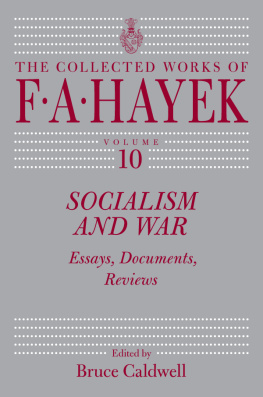
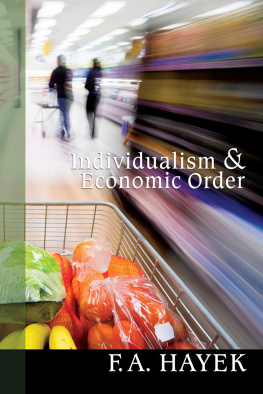
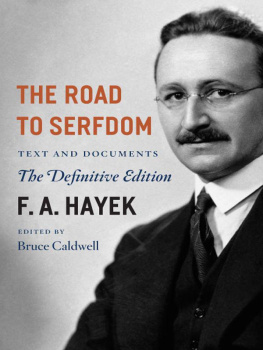
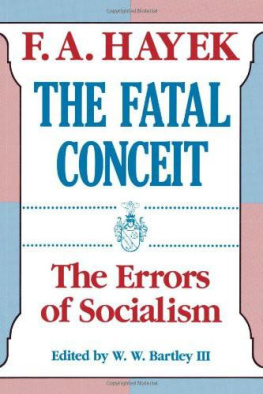
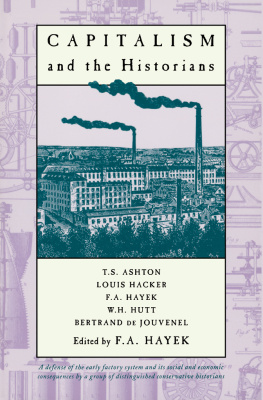
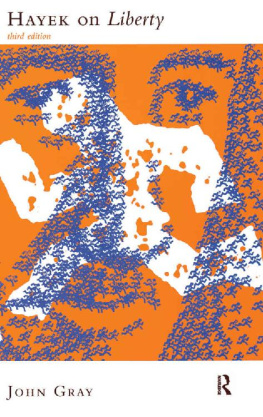
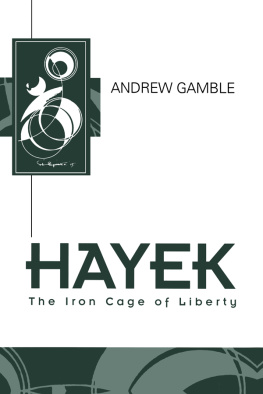
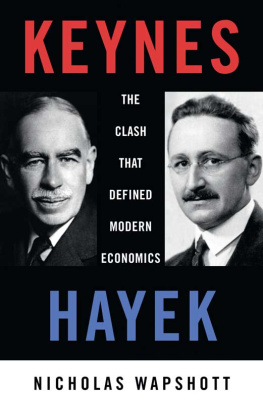

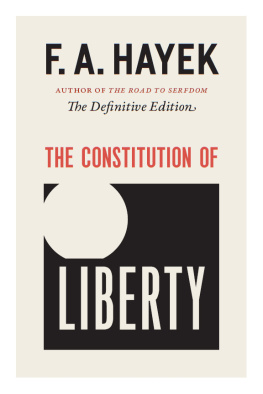
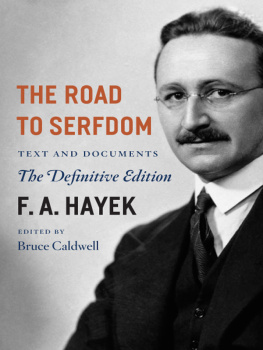

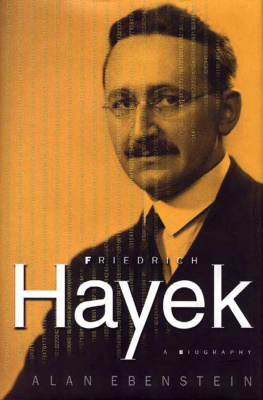
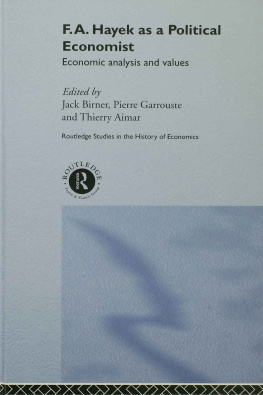
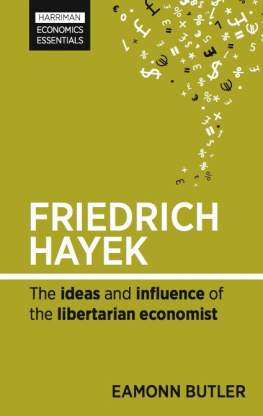
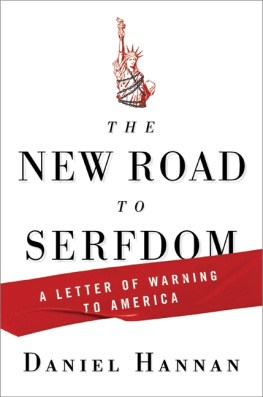
 The paper used in this publication meets the minimum requirements of the American National Standard for Information SciencesPermanence of Paper for Printed Library Materials, ANSI Z39.48-1984.
The paper used in this publication meets the minimum requirements of the American National Standard for Information SciencesPermanence of Paper for Printed Library Materials, ANSI Z39.48-1984.
